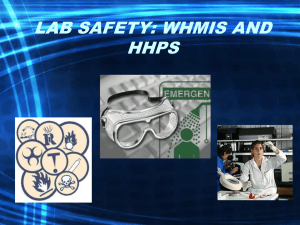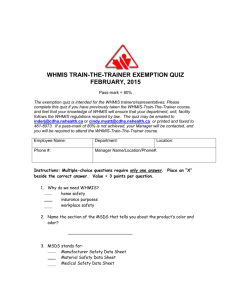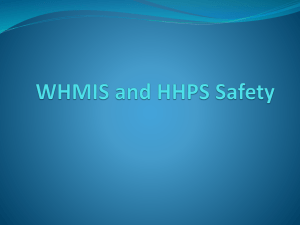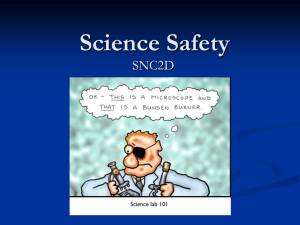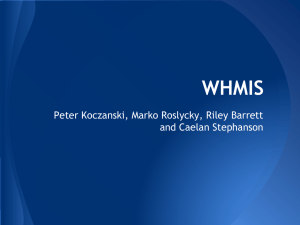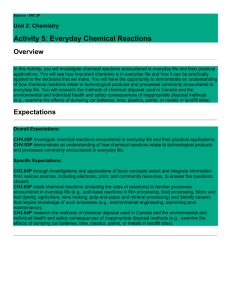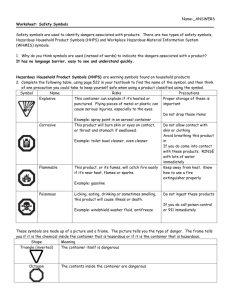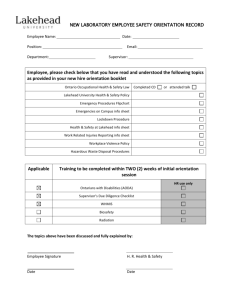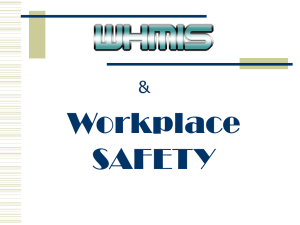WHMIS EXEMPTION QUIZ
advertisement
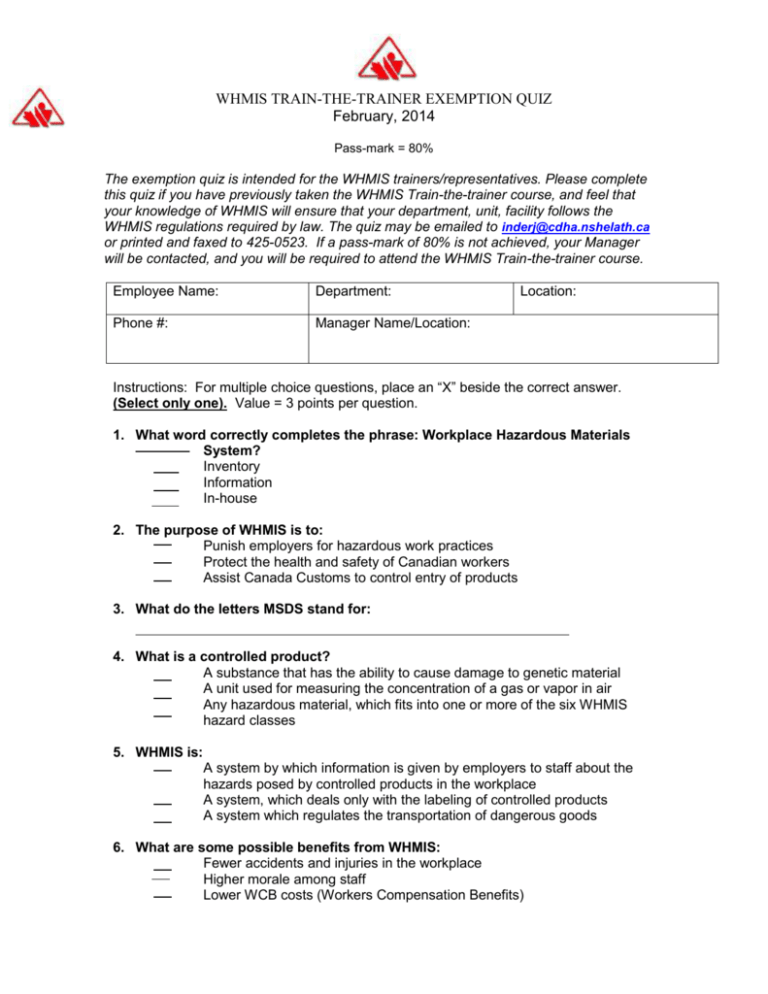
WHMIS TRAIN-THE-TRAINER EXEMPTION QUIZ February, 2014 Pass-mark = 80% The exemption quiz is intended for the WHMIS trainers/representatives. Please complete this quiz if you have previously taken the WHMIS Train-the-trainer course, and feel that your knowledge of WHMIS will ensure that your department, unit, facility follows the WHMIS regulations required by law. The quiz may be emailed to inderj@cdha.nshelath.ca or printed and faxed to 425-0523. If a pass-mark of 80% is not achieved, your Manager will be contacted, and you will be required to attend the WHMIS Train-the-trainer course. Employee Name: Department: Phone #: Manager Name/Location: Location: Instructions: For multiple choice questions, place an “X” beside the correct answer. (Select only one). Value = 3 points per question. 1. What word correctly completes the phrase: Workplace Hazardous Materials System? Inventory Information In-house 2. The purpose of WHMIS is to: Punish employers for hazardous work practices Protect the health and safety of Canadian workers Assist Canada Customs to control entry of products 3. What do the letters MSDS stand for: 4. What is a controlled product? A substance that has the ability to cause damage to genetic material A unit used for measuring the concentration of a gas or vapor in air Any hazardous material, which fits into one or more of the six WHMIS hazard classes 5. WHMIS is: A system by which information is given by employers to staff about the hazards posed by controlled products in the workplace A system, which deals only with the labeling of controlled products A system which regulates the transportation of dangerous goods 6. What are some possible benefits from WHMIS: Fewer accidents and injuries in the workplace Higher morale among staff Lower WCB costs (Workers Compensation Benefits) 7. What is a distinctive characteristic of a WHMIS supplier label? They are always red Cross-hatched border Has name of user written on it 8. If a WHMIS product is decanted in the workplace, the secondary container usually needs what type of WHMIS label: label 9. WHMIS Regulations apply mainly to the: Trucks and trains transporting controlled products Stores where controlled products are sold to the public Workplace where controlled products are used 10. The purpose of a WHMIS label is to: Tell consumers how many items are in a box Alert workers to a product’s potential hazards Help Revenue Canada track the employer’s profits 11. The MSDS for a controlled product must be: Readily available to anyone using the controlled product Routinely updated every year Available in the English language only 12. Who should be trained in WHMIS? Workers only Suppliers and workers only Anyone who handles, uses, disposes or works near controlled products 13. MSDS must be updated every: 6 months year 3 years 14. The specific gravity on a MSDS indicates if: A substance will float or sink in water A material is likely to react violently A material is lethal 15. The MSDS does NOT include: Information about first aid and fire procedures The name of the supplier or manufacturer Information on how to apply and mix the product 16. What does the term Biohazardous mean? A material that contains bacteria, parasites or viruses that can cause disease in humans The ease with which a material evaporates The ability of a substance to enter the body through the skin WHMIS SYMBOLS Place an X beside the correct answer. Value = 4 points per question. 17. This WHMIS hazard symbol corresponds to: Flammable and Combustible Material Corrosive Material Oxidizing Material 18. This symbol corresponds to: Dangerously Reactive Material Biohazardous Infectious Material Flammable and Combustible Material 19. This symbol corresponds to: Materials Causing Other Toxic Effects Dangerously Reactive Material Corrosive Material 20. This symbol corresponds to: Materials Causing Immediate & Serious Toxic Effects Oxidizing Material Flammable and Combustible Material 21. This symbol corresponds to: Materials Causing Other Toxic Effects Materials Causing Immediate & Serious Toxic Effects Biohazardous Infectious Material 22. This symbol corresponds to: Corrosive Material Compressed Gases Dangerously Reactive Material 23. This symbol corresponds to: Compressed Gases Flammable and Combustible Material Oxidizing Material 24. This symbol corresponds to: Corrosive Material Biohazardous Infectious Material Materials Causing Other Toxic Effects PERSONAL PROTECTIVE EQUIPMENT Identify each picture. Value = 2 points per picture. See W.I.S.H. Pocket Chart.
